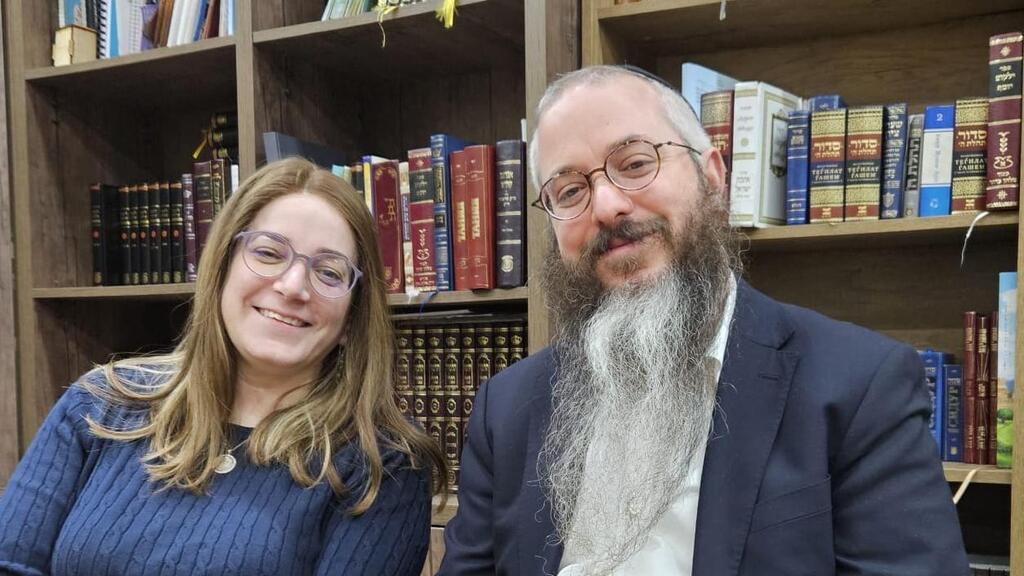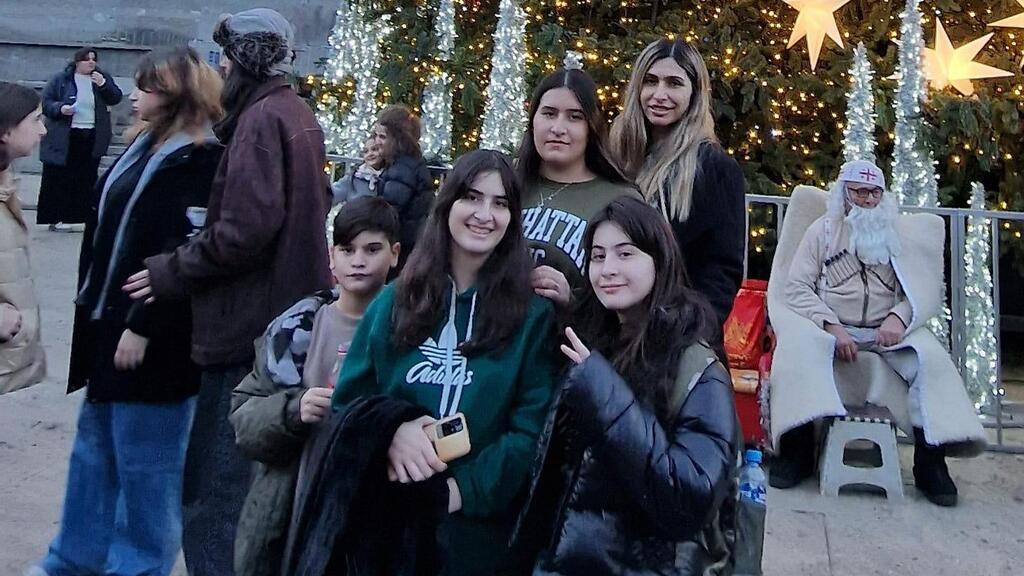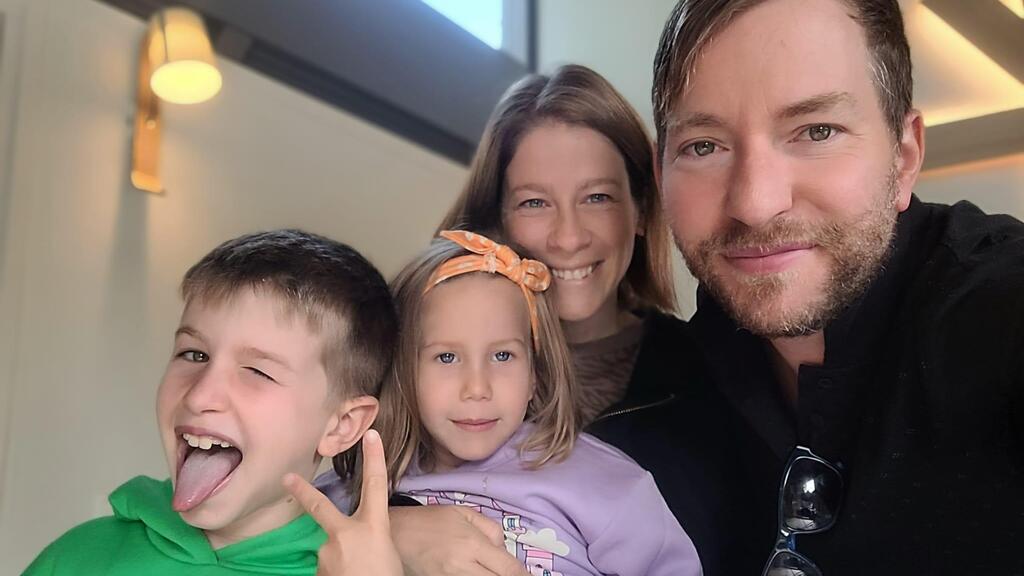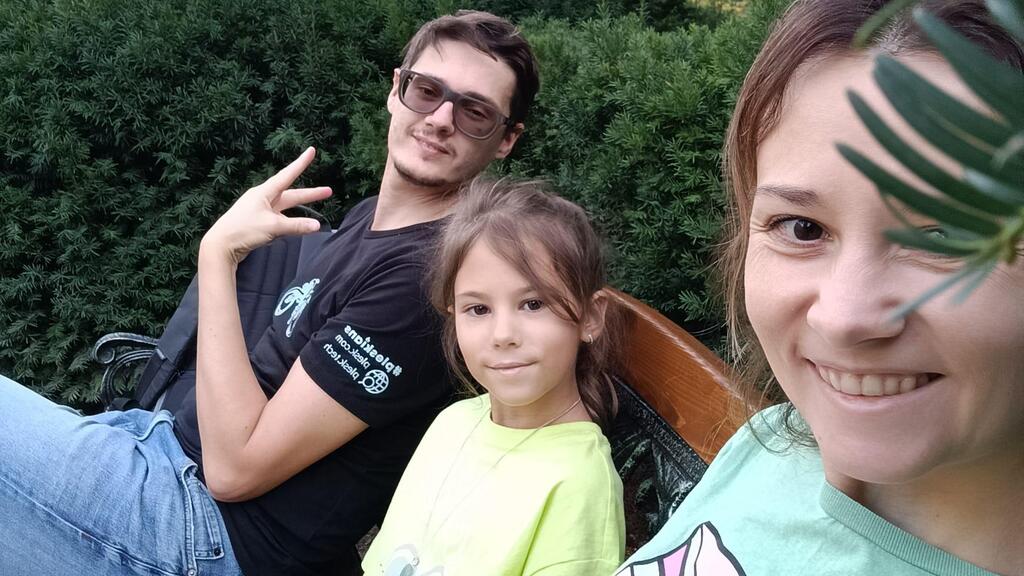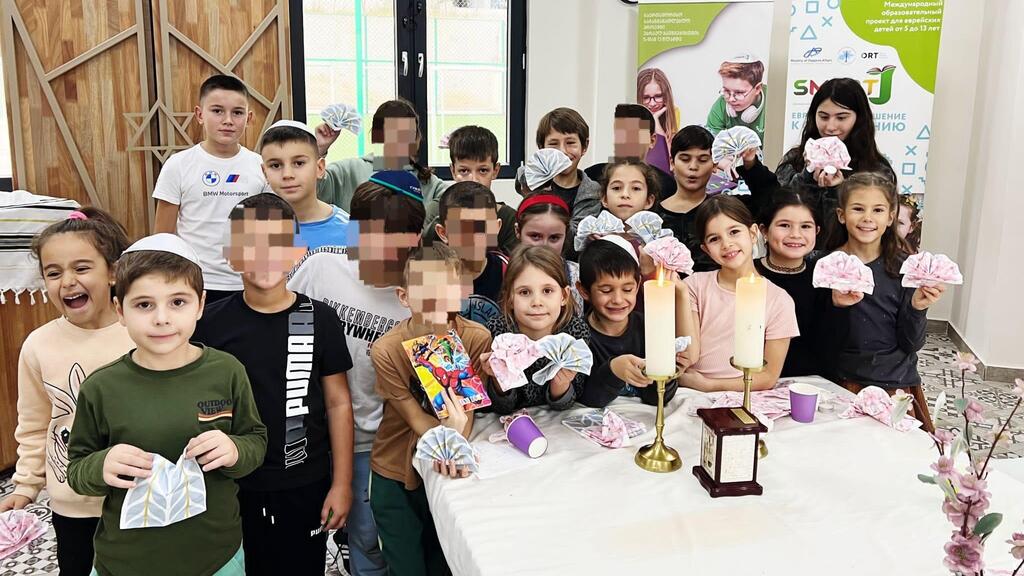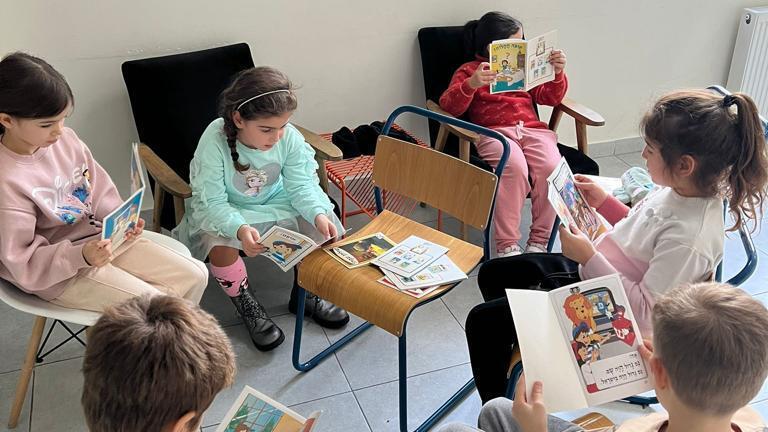The reality of life for the evacuees from the south and north during the war, especially for those with children, has brought diverse challenges that sometimes require looking for solutions, outside the box. In Tbilisi, which currently serves as a safe haven for such families from Israel Chabad was quick to offer education, and a welcome.
Read more:
Rabbi Meir and Tzipi Kozlovsky, Chabad’s emissaries in Georgia, established a temporary school and kindergarten, especially for Israeli children. The temporary educational institutions operate within the compound of the "Or Avner" Jewish school with the assistance of "Shalhavot Chabad". Alongside the children who have already returned to Israel, there are parents who still opt to remain there.
About 30 years ago, when she was seven years old, Albina Ben Dakon immigrated to Israel from the Caucasus with her parents and four siblings and settled in Sderot. She never dreamed that the current war would force her to evacuate with her four children - Shirel, 16, Orel, 15, Anael, 10, and Yehonatan, 8. After a few days with "a generous woman in Kfar Saba who gave us her home," as she puts it, they moved to a hotel in Eilat. On November 1st, they landed in Tbilisi.
"My brother, who has business in Tbilisi and lives in Dubai, offered me his house. Since then, we are here," she says. "It’s less cool for the little kids studying here in the educational frameworks and the older girls studying on Zoom, while all their friends have returned to their normal study and general routines. Most of the time we are indoors. Mainly eating and getting fat," she laughs and immediately adds that the kids are pressing to return to Israel: "We're all in denial. We don't really talk about what happened. October 7th caught us at home. We heard a 'Red Alert' siren and rushed to the secure space as usual. Who even thought about a massacre? About terrorists in the streets? And when we already reached Eilat, the Houthis awakened – and that was when I told the kids, 'Yalla, let's pack. We're leaving the country.'"
7 View gallery
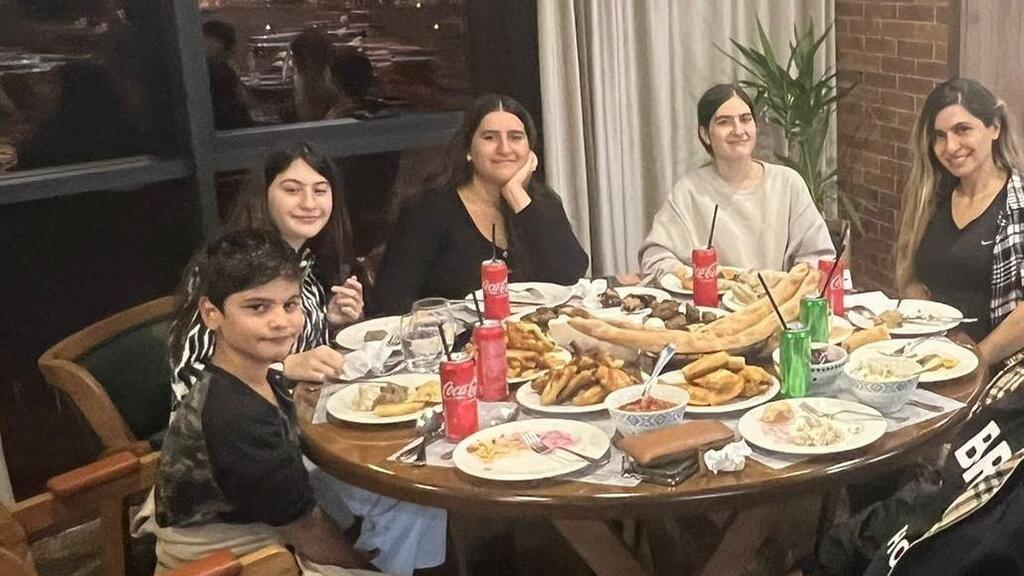

Photo: Albina Ben Dakon with her children in Georgia. The Houthis were the straw that broke the camel's back
(Photo: Courtesy )
As a bookkeeper in a factory in Sderot, she tries to help remotely, despite many workers being sent on unpaid leave. She admits: "The truth is, the kids quickly got used to the good and quiet here. I remind them once in a while that when Gaza is bombarded, all of Sderot trembles. The Qassams began when I was 15, and now I'm nearly 37. We got used to it. But when terrorists entered our city, the first thought that came to mind was that at such an hour, my kid could have been at the playground, alone, and then what could have happened?"
She declares that she won't feel safe in Sderot until there is an absolute victory in the war. "Meanwhile, we miss our family that scattered," she says. "My brother is in Eilat, my mom is at the Dead Sea, my dad completely refuses to evacuate from the house that has already been hit, and he moves back and forth between the house and his sister's in Be'er Sheva. Yet, we remain optimistic and hope that things will turn out for the good and we will win this war. That it will be the last of our wars."
The first available flight
Rem and Roni Reizner from the Ein Zivan Kibbutz in the Golan Heights returned to Israel after a month and a half in Tbilisi, where they stayed with their children, 8-year-old Tomi and 4-year-old Uri. "We're adjacent to the border, the Syrian border, and it was pretty clear to us from the beginning that the northern front might join the war," says Rem.
"When we started seeing the videos from October 7th, we understood that the secure room was no longer a safe place, and it was clear that we would do everything to protect our children without waiting for the government to tell us to evacuate. The fact that I'm not at the age for reserves just made it easier. My business partner in the tourism industry joined us with his family so that also made the decision easier." About choosing Georgia, he says with a smile: "It was the first available flight."
How do you explain this to the children?
"We told them that there are missiles and it's a little tense, and for now we are moving to a safe place. We tried to keep them in a bubble and keep them away them from any stress. Even today, we rarely watch the news or talk about the situation around them. It's been about half a year that I kind of observe a ‘Secular Shabbat'. I turn off my cellular phone on Thursday and turn it back on Sunday. A weekend that is dedicated to the family. Something about that Shabbat and the evacuation from home focused us on what's truly important."
Living far away in Tbilisi, while the war rages here, was complicated for them. "We were torn. Terrified. Far from existential danger, but our hearts were 100% in Israel," he says. "We tried to maintain a routine. We connected to local Israeli WhatsApp groups, and from there we learned about the Chabad’s quick organization to provide a solution for the children, and their holy and inclusive work.
Tomi has already integrated into a local soccer team, and Uri was delighted that at the age of four and a half, she suddenly entered first grade. But, we didn't really manage to disconnect. We all experienced the pain to the maximum, despite the people around us who tried to help and ease the pain. There was incredible mutual support and bond among us, the Israelis. After all, we feel that despite all the polarization - we are together. For better or worse."
And you returned - even though home still isn’t a safe place.
"When we were there, we waited for Nasrallah's first speech and the second speech, and we understood that we can't wait forever, that the IDF had got organized and is protecting the kibbutz and the border, and the children were already crying out for a real and familiar framework. To a kind of certainty. So, we came back home. Back there we had the guys from Chabad and the surrounding frameworks, but it's not like being with the friends from home."
He adds, "In these days of tension, pain, sadness, and anxiety, you find the need to be together and with the familiar, and in Georgia it became very sharp and clear. Everyone who attended the Shabbat meals there came despite understanding that it's a dangerous place to be at that point of time, because of the proximity to Syria, Iran, and Iraq. However, I've been to many places in the world and this is the first time I felt that I am in a country that is truly pro-Israeli and pro-Jewish. I felt loved as an Israeli, as a Jew. It also warmed my heart to see the exhibits in support of the hostages. That the Georgians care about us.”
"Our daughter was afraid to leave the house."
Immediately after October 7th, Yekaterina and Maxim Kosenko also left their home in Ashkelon to the capital city of Georgia, with their 8-year-old daughter Polina. In a short while, they connected through Facebook and Telegram to the Israeli groups in Tbilisi and searched for other Israelis who had fled from the horrors of war. There, Yekaterina saw that an educational framework was being formed for the new children.
"When the sirens and bombings didn't stop, and life under threat became unbearable, it was clear to us that we weren’t staying in Israel," she recalls. "Polina, like us, was worried and very sad. She was afraid to leave the house. From our point of view, it was a sign that time has come to visit a country we had wanted to visit for a long time. The best gift we received was Chabad’s school: Polina was free and happy, while the schools in Ashkelon were closed and her friends were confined to bomb shelters. The framework at Chabad brought her happiness after all the great suffering she had endured; she connected to the children there. We worked from home. We led lives as close as possible to routine."
Recently they returned home to Ashkelon. "There, we felt how much we needed the calmness and tranquility that Tbilisi offers, until we felt the need to return home and the situation seemed less dangerous than in the beginning. We missed our surroundings and friends," Yekaterina explains. "Polina missed her friends, most of whom returned to Ashkelon. The school reopened, as did the sports clubs. We are starting to feel normal here. Still, we have a lot of gratitude and appreciation for Chabad and the wonderful school, for the staff and students who gave us an opportunity and welcomed us warmly. We have good memories from the people who didn't let us be alone, and Polina still has good friends from there whom she keeps in touch with, but it's good to be home."
Chabad’s emissaries in Georgia, Rabbi Meir and Rebbitzin Tzipi Kozlovsky, arrived in Tbilisi 19 years ago as a young couple in advanced pregnancy and a daughter just over one-year-old. Today they are parents to eight children, three of whom are in institutions in Israel. "I suppose people searched for a nearby destination with flights once a day, if not twice," says Meir as he tries to crack the secret behind the attraction to the destination, "a destination without anti-Semitism, relatively quiet, and cheap."
Meir, who served in the IDF as a combat soldier, requested to enlist in combat at the beginning of the war but was turned down. Tzipi, whose warm smile fails to cover the accumulating fatigue, says, "I am in favor of everyone giving their best. Now our mission is to help those who come here."
Meir confirms: "Suddenly, from nowhere, families with children entered the Chabad House, and I'm talking to you about more than 500 families. Now, I believe there are over 150 families that remained here with more than 100 children enrolled in the school and over 20 children in the kindergarten. At the beginning, they glanced at the books, played games, and came to pass the time. After a few days, Tzipi came over to me and said, 'We have a large school here. We can do something with this.' It was in the second week of the war. People gathered here and they were going crazy; they didn't know what to do with the children who themselves were going crazy at home. I thought about Tzipi's initiative and told her that it could be an excellent idea. We are anyway running a school in Hebrew for Israelis, mainly for those living here permanently. There is an educational framework for ages one to 18. The school accommodates about 160 students who arrive every day."
Alongside the education for the children and organizing meals on Shabbat and holidays, the Kozlovsky couple have turned the Chabad House into a vibrant location with evening study sessions for men and women, Mega Challah events with many participants, and more. The encounters between the Chabad emissaries and the forced evacuees, have led to many emotional moments that have left, according to them, an everlasting impression: "Many spoke about the rift they feel and how it's hard for them to enjoy life when they are constantly thinking about their homes and family members under attack."
“Women shared the difficulty with the lack of frameworks for the children, about the difficulty of coping with the situation," notes Tzipi. "Many spoke about the breakdown of their value system. One said, 'I was the first to believe that, on both sides of the aisle, live mothers who are all seeking and wanting the same thing - to raise children peacefully and quietly. Now I am asking many questions that in the past I didn't need to ask.' Another said that the terror attack led her to grapple with questions about her Judaism."
"We welcomed everyone with open arms"
In photos from the days of the war at the school, orthodox children with black kipot (skullcaps) and peot (sidelocks) are seen playing alongside secular children. "We welcomed everyone with open arms. Are you Jewish? You're with us! Mixed classes of boys and girls, children who wouldn't usually study together in school because each chooses their own type of education, and here at the school, we are very gentle with them," Rebbitzin Kozlovsky says.
"On the other hand, this new school, called 'Shalhavot,' operates within the 'Or Avner' school, and situations arose that didn't exist before hand - because until now everyone who came to our school knew that he arrived at a Jewish school with tradition: the boys come with kipot, the girls with skirts. There were no questions. The new children who arrived needed a framework; they didn't choose anything. They wanted Hebrew and to be together. Therefore, naturally, many questions arose."
Meir says the families are physically in Tiblisi but still live in Israel. "At the beginning, they asked where is the nearest shelter? One evening, I went with an Israeli to the synagogue. When a loud car passed by, he immediately held me tight. I saw the fright in his eyes and understood exactly where it came from. To hear the children updating where there are sirens, where there were bombings – that is our routine," he says.
"They're scared. They live here modestly and try to maintain a routine," Tzipi adds. "Some of them are living off their savings. They are not tourists coming here for shopping and traveling. Many of them are not at peace with themselves and have a thought – how are we here while everything in Israel is burning. But it can be understood that the circumstances of life led them to live here for the moment. Over time, needs arose, we opened our hearts, souls, and the Chabad House for them, until there was no more room to accommodate them, and we had to think creatively."
"In the kindergartens, everything is free, while at the school, the price is symbolic, and that’s only for those who can afford it," explains Tzipi. When she felt that she didn't have the means to provide a framework for the large number of children of school age, she decided to turn to the 'Shalhavot Chabad' network in Israel, under the management of Rabbi Eliyahu Krichevsky, who established from the beginning of the war special classes for evacuee children from the age of kindergarten in the Dead Sea and in Kfar Chabad.
"They immediately accepted the challenge and took care of all the professional aspects. In parallel to the administrative aspects, volunteers arrived from Israel, deeply imbued with a sense of mission. Within a few days it miraculously succeeded. The school opened its doors wholeheartedly: the laboratory, the library, and the music room turned into classrooms that accommodated additional students, and thus more and more children joined the 'Or Avner' family."
The director of the Chabad Education Network in Israel, Rabbi Yosef Yitzchak Aronov, summarized and stated "amidst all the terrible pain and our prayers for the return home of all the soldiers and hostages safe and sound, we are acting in accordance with the directives of the Lubavitcher Rebbe and out of a desire to meet the needs of the evacuated parents."


